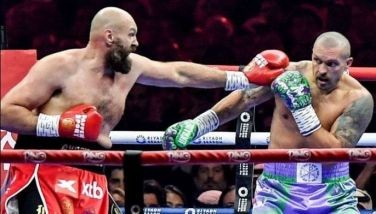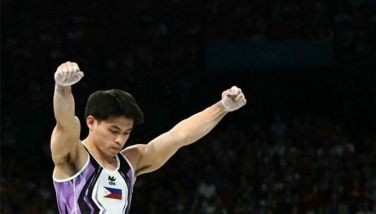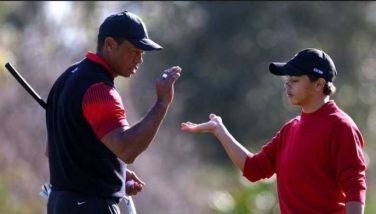Work in progress

National coach Yeng Guiao will be the first to admit that Powerade Team Pilipinas is still a work in progress although the recent two-game series with the Great White Sharks of Australia showed it’s definitely on the right track.
Adjusting to FIBA rules is a priority because in the PBA, the action is a lot less physical due primarily to the no hand-check rule. In international competitions, the national team will more often than not be outsized by the opposition so it’s critical to be able to take the physicality of banging bodies without backing down.
Some FIBA rules to get used to include no timeouts called by a player, every technical foul to mean two free throws and possession, 10-minute quarters instead of 12 (raising the recognition of pacing, timing and urgency), less timeouts (five in all compared to six regular and three 30-seconders in the PBA), five personal fouls (including technicals) for disqualification and a 24-second reset (in the PBA, the reset is 14 seconds or whichever is more from what is left in the 24-second clock).
In the Australia series, it was evident the Philippines has to work on sharpening its three-point shooting (8-of-27 or .296 in the first game and 7-of-27 or .259 in the second), cutting down on turnovers (at least, they should be less than assists), playing defense with more feet and less hands (the Sharks were awarded 31 free throws in the first game and 40 in the rematch – too many to give up), converting free throws consistently (only 11-of-19 or .579 in the first game and 22-of-31 or .710 in the second) and boxing out (in the second game, Australia had more rebounds, 51-44, mor e offensive rebounds, 17-8 and more second chance points, 19-7).
* * * *
However, there were more than enough positive indicators to build on. First, the national team did an excellent job of running transition, scoring more fastbreak points in the first game, 18-8, and the second, 21-11, despite seven less rebounds. Second, Guiao’s rotation worked like clockwork with the bench providing fluid continuity to the attack. In the first game, Guiao’s reserves hit 51 points to Australia’s 18 and in the second, the advantage was 71-50. Bench scoring is crucial in the 40-minute FIBA game where the distinction between starters and relievers isn’t significant. And third, Guiao’s system of equal opportunity brought out the best in his players. In the first game, 13 of Guiao’s 14 players logged at least 10 minutes with Kerby Raymundo the only one to breach the 20-minute mark. In the second game, the pattern was the same although Raymundo, Arwind Santos and Asi Taulava played at least 20 minutes because of the overtime.
In the FIBA-Asia Championships where the Philippines will be the underdogs against bigger teams like China, Qatar and Lebanon, it’s vital for Guiao’s charges to sustain a fast pace, keep dribbling to a minimum, shoot within 15 seconds of the shot clock, hit at least .350 from the arc, knock down at least .800 from the line, vary defensive looks and limit turnovers to less than 15.
Those are quantifiable targets that could lead to offsetting the expected disadvantage under the boards because of the size factor.
Another thing to remember is the players can’t be afraid to bang bodies and play physical. Guiao will make sure of that.
Intimidation changes shots and disrupts timing. Mental toughness is essential. An underdog can’t be fazed by odds. The idea is to take a stand and compete to win, not just for the sake of playing the game.
Of course, it’s easier said than done when you’re out on the court, faced by opponents who are heads taller. But that’s where focus comes in. If you’re out there to win, you’ll show it by the way you play – your hustle, your refusal to back off from the challenge of a mismatch and your attitude of defiance.
* * * *
Quickness in execution is another key. But the danger of playing a fast clip is you open up the possibility of being blown out on the other end. Sometimes, the prudent thing to do is to play a slow pace – a defensive tactic aimed to throw off the other team’s rhythm and keep the scores close to give the opportunity for the underdog to steal the game down the stretch. That’s the dilemma facing Guiao.
In the halfcourt, the Philippines obviously can’t take its sweet time dribbling and looking to set up at the post. For one, the post option probably won’t be available because of the defense. For another, holding on to the ball too long will take away passing possibilities to find an open look. The premium must be on snappy ball movement with players constantly on their feet, looking to get a pass and keeping the defense out of position.
The coming All-Star series will put the national team to an even more severe test and if FIBA rules are applied, it will give Guiao’s squad more exposure to adjust to the international game. Chemistry is something that is evolved through time and the national team must grab every opportunity to work on playing together as a unit before showing up for the SEABA tournament in Medan in June en route to earning a ticket to the FIBA-Asia Championships in Tianjin in August.
- Latest
- Trending
































